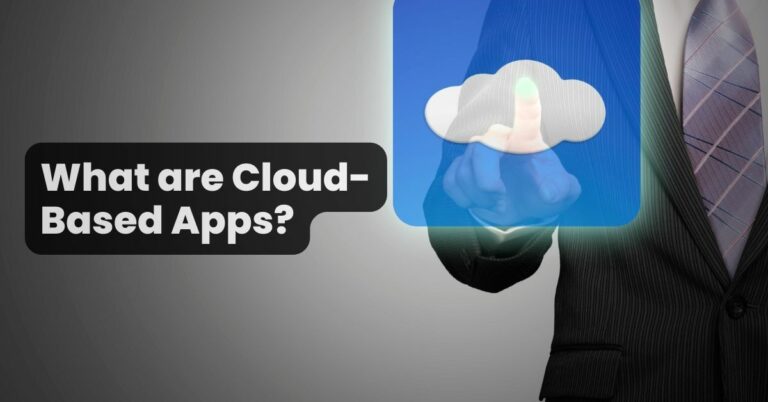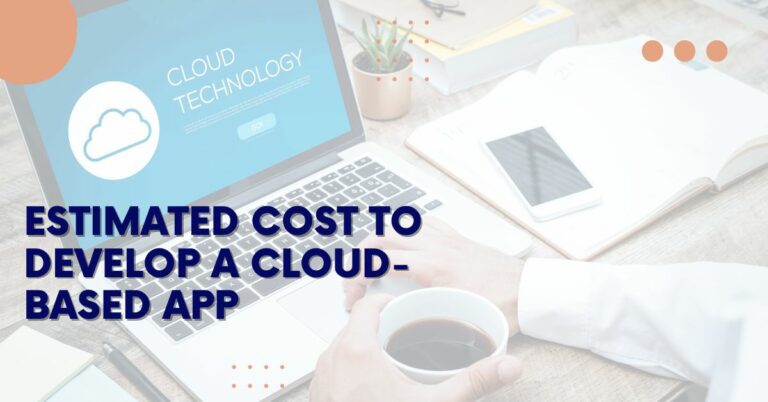The mobile app industry is growing at an unprecedented rate. In fact, according to recent statistics, the global mobile app market is expected to reach $935 billion by 2023. With such a large and rapidly growing industry, it’s no wonder that more and more businesses are looking to get in on the action. But with so many options out there, it can be hard to know where to start. The answer is cloud apps!
With so much talk about the cloud these days, it’s no wonder that businesses are looking to move their apps and data there too. One option that is becoming increasingly popular is cloud-based mobile apps. The reason behind this massive popularity is- Cloud-based apps can be accessed from anywhere, at any time, and from any device. They are also more scalable and easier to manage than traditional, on-premises apps.
In this blog post, we’ll explore what cloud-based apps are and how they can benefit your business. We’ll also show you the top reasons why you should consider going for cloud-based mobile apps, what are the steps in building a scalable cloud solution for your business, and how easy it is to get started with cloud-based apps. In the end, we will also discuss the estimated cost of developing a cloud-based app for your business.
What are Cloud-Based Apps?

A cloud-based app is a type of software that runs on the cloud, instead of on your local computer or server. This means that you can access your data and files from anywhere, as long as you have an internet connection. Cloud-based apps have many benefits, including increased collaboration, flexibility, and scalability. They can also help reduce costs, as there is no need to install or maintain local software.
Some popular cloud-based apps include Google Drive, Dropbox, Office 365, and Adobe Creative Cloud. These apps offer users the ability to access their files and data from anywhere and can be used on a variety of devices.
As per recent research, cloud-based apps will continue to grow in popularity and usage. A recent study by Forrester found that 74% of enterprises will be using cloud-based apps for mission-critical workloads by 2022. This is up from just 47% in 2018. Wondering why such massive popularity? Continue reading the blog.
Why are Cloud-Based Apps Gaining Popularity in Recent Times?

There are a number of reasons why cloud-based apps are becoming more popular. One reason is that they offer improved scalability. Cloud-based apps can be quickly scaled up or down to meet changing business needs. This is in contrast to traditional ones, which can be more difficult and costly to scale.
Another reason for the popularity of cloud-based apps is that they offer greater flexibility. Businesses can choose from a wide range of cloud-based apps to meet their specific needs. They can also easily integrate cloud-based apps with other business systems. Previously the software was more difficult to customize and integrate.
Finally, cloud-based apps can offer significant cost savings compared to traditional, on-premises software. Cloud providers typically charge based on a pay-as-you-go model, which can save businesses money compared to the upfront costs of purchasing and deploying on-premises software. In addition, cloud-based apps often include automatic updates and upgrades, which can further reduce costs.
There are plenty of other reasons to develop cloud-based mobile apps. The following are some of the most compelling:
- Saves Additional costs: With cloud-based apps, it’s easy to scale up or down as needed, without having to worry about expensive infrastructure costs.
- Always up-to-date: Since cloud-based apps are updated automatically, you can be confident that your users are always using the latest version.
- Reduced development and maintenance costs: By leveraging the power of the cloud, you can save on development and maintenance costs since much of the work is done by the cloud provider.
- Improved security: Cloud providers typically have robust security systems in place, so you can be sure your data is safe and secure.
Read Also: How to Choose the Best HIPAA-Compliant Cloud Storage?
Why You Should go for Cloud Apps?
Cloud-based mobile apps offer a number of advantages over traditional, on-premise apps. Perhaps the most significant advantage is that they can be deployed much faster and at a lower cost. Cloud-based apps also offer greater flexibility, as they can be easily scaled up or down to meet changing needs. Additionally, cloud-based apps are typically more reliable and secure than on-premise apps, as they benefit from the expertise of the cloud provider.
Another key advantage of cloud-based apps is that they can be accessed from anywhere, at any time. This is particularly beneficial for organizations with employees who work remotely or who travel frequently. With a cloud-based app, employees can access the latest version of the app from any location with an internet connection. Finally, cloud-based apps are often easier to maintain than on-premise apps, as updates can be rolled out quickly and automatically by the cloud provider.
Let’s learn about all these advantages of cloud-based apps in detail below-
1.Increased Flexibility and Scalability
Cloud-based apps are more flexible and scalable than on-premises apps. With cloud-based apps, you can quickly scale up or down as needed without having to make any infrastructure changes. This is perfect for businesses that experience seasonal spikes in demand or unexpected growth spurts.
2.Facilitates Improved Collaboration
Cloud-based mobile apps facilitate collaboration by allowing users to share real-time data and documents. This makes it easier for teams to work together, regardless of location. For example, you can easily share documents and files, make comments and edits in real-time, and track who’s working on what with built-in activity logs.
3.Saves You a Huge Money
Developing cloud-based mobile apps can save you money in the long run as you don’t have to invest in expensive on-premises hardware and software. You also don’t have to hire extra IT staff to manage your system since the provider takes care of all that for you. Additionally, there are no maintenance costs associated with cloud-based app development.
4.No More Worries about App Security
Cloud-based app development platforms offer increased security features, such as data encryption and user authentication, which help to protect your data from unauthorized access. When you store data in the cloud, it’s more secure than keeping it on your own premises. Cloud providers have robust security measures in place to protect your data from cyberattacks.
5.Can be Accessed Anytime, anywhere
With cloud-based apps, you and your employees can access the system from anywhere there’s an Internet connection. This is convenient for remote workers and gives everyone the flexibility to work from wherever they want.
How to Develop a Cloud-Based App?

The cloud-based app development market is growing rapidly. In fact, it is expected to reach $371 billion by 2025. With so much opportunity in this space, it’s no wonder why more and more businesses are looking to develop a cloud-based app. But what does it take to develop a successful cloud-based app? Let’s explore the key considerations for developing a cloud-based app, from architecture to security to scalability.
Step- By-Step Guide to Developing a Successful Cloud-Based App
Step 1. Plan Your App
First, you need to plan your app idea & then define the scope and requirements of your app. Creating a clear roadmap at the outset will save you time and money down the road.
Here are some questions to consider:
- What is the purpose of your app? What problem does it solve?
- Who is your target audience? How will they use your app?
- What features do you need to include to make your app successful?
- What kind of data will your app be handling? How will it be stored?
These are just a few of the questions you need to answer before you can start developing your cloud-based app. Once you have a good understanding of what you’re building, you can move on to setting up your development environment. You should create a minimum viable product (MVP) to test the market demand.
Step 2. Research the competition
See what similar apps are out there and what they’re doing well (and not so well). This will help inform your own app development process.
Step 3. Develop a Prototype
Once you’ve validated that there is a market demand for your app, the next step is to develop a prototype. This will help you not only visualize your app but also give you something to show potential investors and partners. Prototyping doesn’t have to be complicated or expensive – there are many online tools that can help you quickly and easily create a prototype.
Step 4. Choose the right Cloud platform
If you want to develop a cloud-based app, the first thing you need to do is determine which type of cloud platform you want to use. Not all platforms are created equal—so do your research to find the one that best suits your needs (and budget).
There are three main types of cloud platforms: public, private, and hybrid.
- Public cloud platforms like Amazon Web Services (AWS) and Microsoft Azure are owned and operated by large companies that rent out their infrastructure to anyone who wants to use it.
- Private cloud platforms like OpenStack and VMware vCloud are owned and operated by a single organization, usually a company, and can only be used by that organization.
- Hybrid cloud platforms like Google Cloud Platform (GCP) combine elements of both public and private clouds, giving organizations the flexibility to use the best option for each individual workload.
Step 5. Select the right development tools and frameworks
Once you’ve decided on a platform, the next step is to choose a programming language, tools & frameworks. The most popular languages for developing cloud-based applications are Java, Python, Laravel, Ruby on Rails, and Node.js. However, there are many other options available, so be sure to do your research before making a decision.
Select those that will work best for your particular project requirements.
Step 6. Start Building MVP
After developing a prototype, the next step is to start building out your MVP. This is where you’ll start coding your app and adding features. It’s important to keep your MVP relatively simple at first so that you can get it to market quickly and then iterate based on feedback from users.
As you’re building out your MVP, it’s also important to start thinking about how you’re going to monetize your app. There are a number of different ways to monetize apps, so it’s important to think about which model makes the most sense for your particular app.
Step 7- Develop Wireframes/Mockup of App
While developing your app, the first thing you need to do is come up with a list of features that your app will have. Once you have your list of features, you need to start designing the user interface for your app. This includes creating wireframes or mockups of how your app will look and function.
Step 8. Develop a robust testing plan
Be sure to test your application thoroughly before making it available to the public. It’s vital to ensure that your app is stable and bug-free before launch—otherwise, you risk disappointing users (and losing them for good). Once your app is coded, you need to test it to make sure everything is working correctly.
Step 9. Deploy Your App
Finally, you’ll need to deploy your code to the server and make sure that everything is working as expected. This can be a bit of a trial-and-error process, but once everything is up and running smoothly, you’ll be able to relax and enjoy the fruits of your labor!
Step 10. Launch & Promote your app
Finally, once your app is complete and ready for launch, you need to promote it to get people to download and use it. Once your app is live, make sure to let people know about it! Use social media, online ads, and word-of-mouth to get the word out there!
Estimated Cost to Develop a Cloud-Based App

The cost of developing a cloud-based app can vary depending on a number of factors.
- The size and complexity of the app
- the platforms it needs to be compatible with
- the level of customization required and
- other factors like development team rates etc.
Putting together all the above factors, here is an estimation of the total price to develop a cloud-based app for your business.
- A simple cloud app with basic functionalities and features can cost you around 40,000 to 60,000 US dollars.
- Medium functionality cloud-based applications can cost you around 61,000 to 120,000 US dollars.
- A complex cloud app with high-end features and functionalities can cost you more than 150,000 US dollars.
You also have to maintain user support from the SAAS service providers which can cost you anywhere between 50,000 to 90,000 US dollars per year.
Please note that all the above-given values are calculated approximately for developing and support of the cloud-based application and it can vary for the different apps.
Conclusion
I hope, this article has convinced you why to switch to cloud-based apps. In conclusion, cloud-based mobile app development is here to stay and will only become more popular in the coming years. If you’re not already on board with this trend, now is the time to start investigating its potential for your business. With so many benefits on offer, there’s really no reason not to give it a try.
Build exceptional cloud-based apps with top professionals!
Hire Top Cloud App Development Solutions from an Award-Winning Company
Experience improved performance, custom-made cloud with guaranteed uptime & connected systems with our built cloud-based solutions for your business!
Being a CMMI level 3 & ISO Certified Cloud app development company, QSS Technosoft is proficient in delivering a range of cloud services including AWS (Amazon), GCP (Google), and Azure to our clients across the USA. We help you seamlessly manage your increased IT infrastructure data with our top-class cloud app development services.
Till now, we have delivered various cloud apps helping our clients gain business agility and efficiency to thrive in this era of digital transformation. Our expert cloud developers have all expertise to host applications on AWS (Amazon), GCP (Google), and Azure cloud application development and deployment services saving cost in post-deployment operations.
You can hire us for services like cloud app development, cloud migration services, Amazon, Google & Azure Cloud deployment, cloud testing, support & maintenance. Our cloud app developers can be hired on flexible engagement models and are ready to work in your country’s time zones.
Have a project in mind? Tell us your requirement or connect over a quick free consultation call!
We are proud to mention that our work has been recognized by leading B2B reviews and research platforms like GoodFirms, Clutch, MirrorView, and many more.


Why Cloud Apps are a Hit? (Benefits, Development & Cost Analysis)